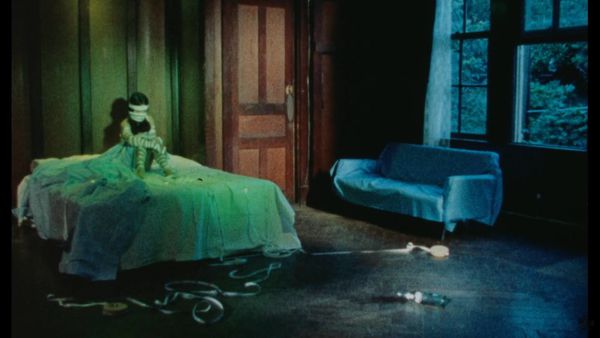Eye For Film >> Movies >> Bye Bye Love (1974) Film Review
Bye Bye Love
Reviewed by: Jennie Kermode

A fine example of French New Wave cinema tragically overlooked because it was made in Japan, by Japanese people, a few years later, Isao Fujisawa’s Baibai Rabu, or Bye Bye Love, explores the classic themes of youthful impulsivity, whirlwind romance, crime and existential angst. It objectifies the feminine body as a source of mystery, alongside a masculinity so full of repressed rage that it barely has any more agency – and yet at this additional remove, and after the end of the Summer of Love, everything looks a little different.
Ren Tamura, who would later enjoy a brief career as the voice of a Transformer, is the angry young man. He has named himself Utamaro, and after he rescues a young shoplifter (Miyabi Ichijô) from one of a series of comedically incompetent police officers, he names her Gîko. Whereas he wanders through life looking for trouble, she has a more hedonistic philosophy, helping herself to whatever she wants and living off other people. This includes a wealthy American artist whom she calls Nixon (Enver Tenpai), who doesn’t take too kindly to what he finds Utamaro doing to her – or to his home. After a messy confrontation, the young lovers go on the run, encountering an assortment of unlikely characters and situations along the way.

Alternating between road movie formula and surrealist exploration of interior landscapes, Bye Bye Love is full of striking imagery, and it resolutely avoids playing by the rules. Utamaro’s early treatment of Gîko borders on attempted rape, and she responds with anger. When they fall in love regardless, there’s none of the usual ‘she wanted it really’ vibe of contemporary US movies, more an observation of the strangeness of human emotion. When he finds out that she wasn’t born typically female, he’s disappointed, clearly thinking of himself as straight, but his fascination with her doesn’t go away, and he becomes obsessed with photographing her in sensual poses. “Why do I need to be a woman?” she asks. identity, like behaviour, is treated as a detail. The connection between these two people is something deeper, and it allows them to pursue a deeper truth as both experience a shift of perspective.
Infused in all this is a sense of what it might have meant to be Japanese in this, the first truly post-war generation, coming of age in a country which was itself changing at breathtaking speed, and surrounded by foreign cultural elements. Fujisawa’s camera drifts through stores full of round-eyed mannequins. Gîko perches on the bonnet of the car with a half-shut parasol over her face, looking like a yokai. Utamaro admires her stolen Doors LP. She delivers a single musical number, imagining herself as a sex worker, a favourite subject of the Japanese cinema of the time. They discourse on the significance of words, on making money. They drive too fast along clifftop roads and it’s clear that they’re headed for trouble, but their world exists only in the moment, and the scenery is always beautiful.
After many years in the wilderness, this film is finally enjoying a revival of sorts. Within the context of its native country, it’s a true original, and a must for students of cinema. Its final shift of perspective will leave you wondering if you have been paying attention to the wrong part of the narrative all along. Who is self and who is other? Who is real and who is imaginary? Fujisawa’s muses are not otherworldly beauties wrapped in furs or decked out in sharp suits with cigarettes. They can blend into a crowd. They could be anywhere. They could be anyone. Even you.
Reviewed on: 16 Oct 2024















